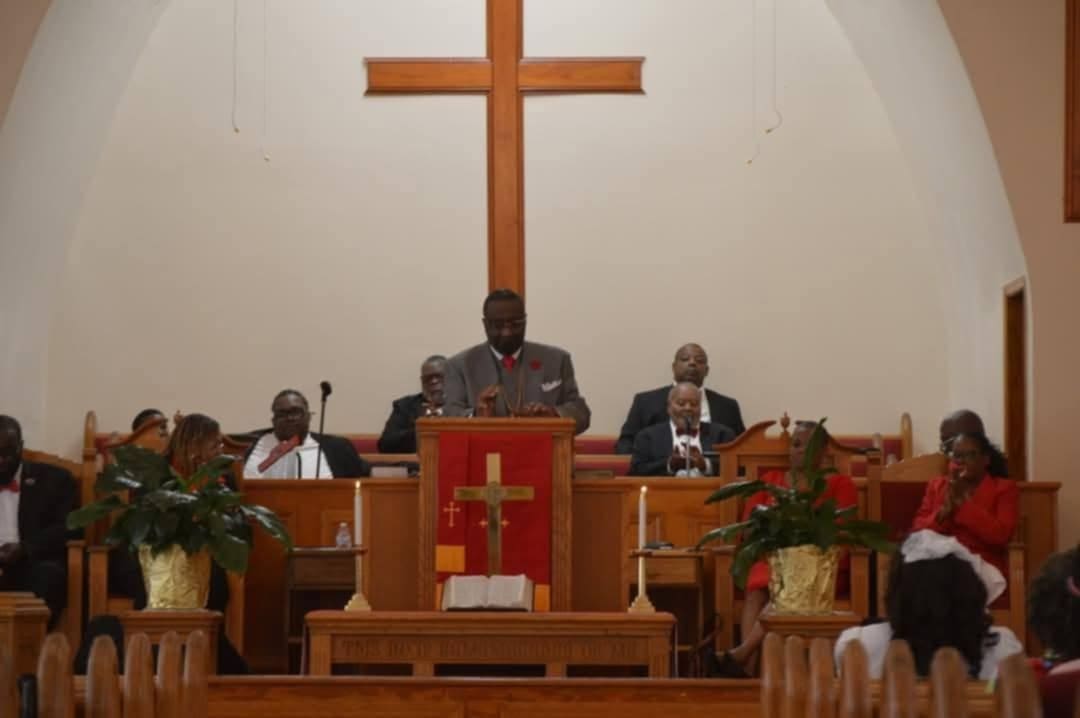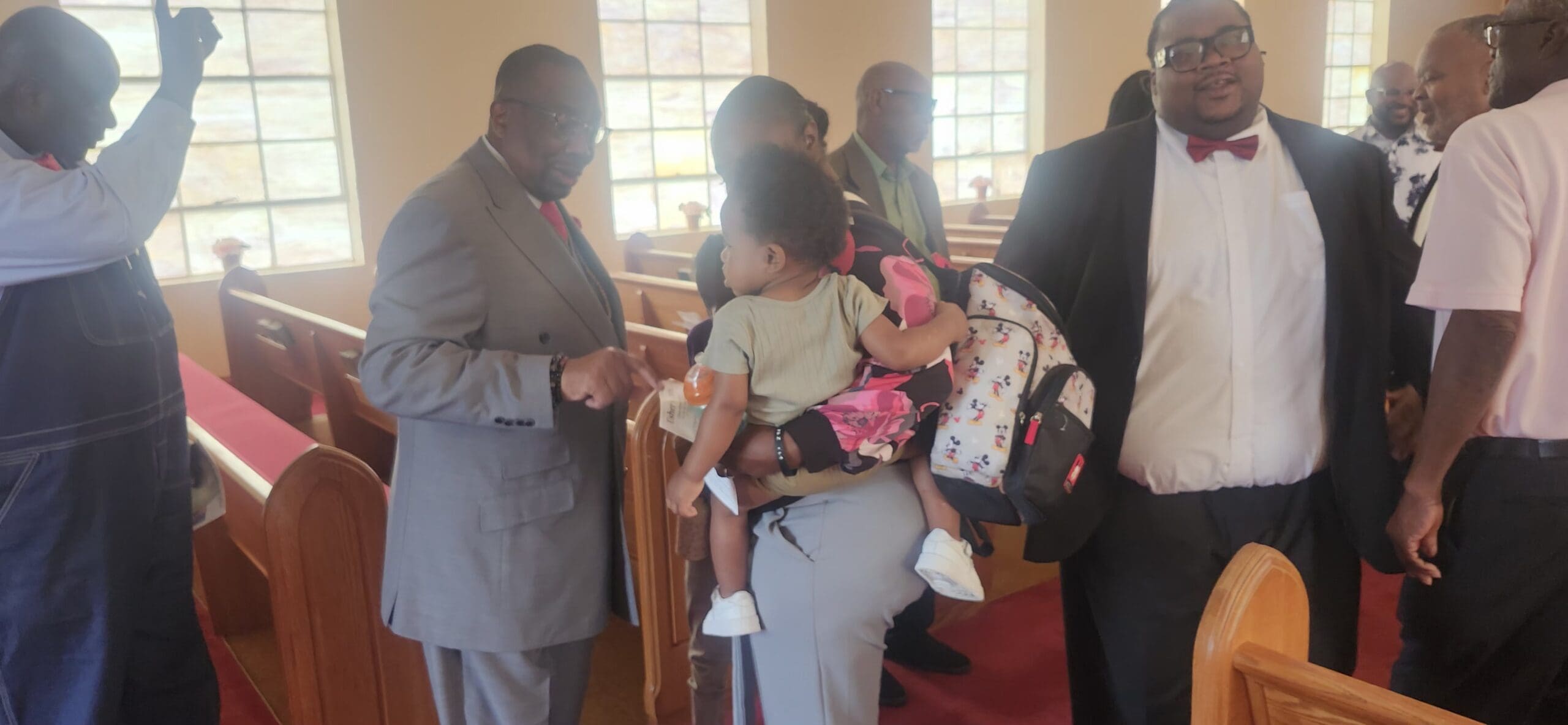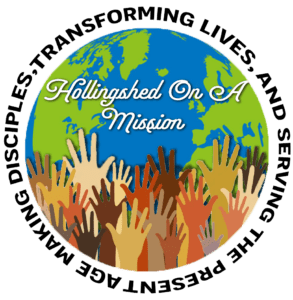Returning to the place where I was born and raised filled my heart with deep gratitude and reflection. It was truly an honor and a blessing to preach and campaign at my home church, Usher’s Temple CME Church in Fort Valley, Georgia on Pentecost Sunday, June 8, 2025. Fort Valley is more than just my hometown; it’s where my roots were planted and nurtured by strong men and women who helped shape who I am today. It was there, in that close-knit community, that I first learned the values of leadership, service, and faith. After I preached, Dr. Nathaniel Brown, my former Boy Scout leader, walked up to me and said: “Don’t forget where you came from—Troop 606.” That moment struck a deep chord in me. Dr. Brown has been one of the most influential figures in my early development. He was not only my Scout leader, but also the head of the Agriculture Department at Fort Valley State University, a trustee of our church, and a Sunday School teacher.
His words took me back. Troop 606 wasn’t just a Boy Scout troop, it was a life-shaping experience. I vividly remember camping in the woods of Fort Valley, building campfires, practicing survival skills, tying knots, going fishing, cleaning our fish, and cooking it together as a troop. We felt like we could conquer anything! Those unforgettable experiences taught us more than just how to survive outdoors; they helped shape who we became as men. We learned core values such as resilience, teamwork, self-reliance, and, most importantly, collaborative leadership. One value that still guides me to this very day is the Boy Scout Motto: “Be Prepared.” In Troop 606, that meant more than having gear or knowing how to start a fire; it meant being mentally, emotionally, and spiritually ready for life’s challenges. That motto continues to shape my approach to ministry and leadership: being prepared to listen, serve, collaborate, and lead with integrity.

On my campaign journey, some people have asked me, “What is collaborative leadership, Rev. Hollingshed?” As I’ve explained in conversations, I realized there may be others who would also benefit from a clear definition. Collaborative leadership means the leader doesn’t lead alone. Instead, church leaders intentionally collaborate with others, including lay members, clergy, youth, elders, bishops, and even voices from outside the church, to build stronger, more effective ministries. It’s based on the belief that everyone has a part to play in the Body of Christ. No one voice or thought process, no matter how educated and gifted, can reflect the full wisdom, perspective, and needs of an entire organization, a church, an annual conference, a district, or a community. And no one person can or should carry the weight of leading every ministry or fulfilling every role. Collaborative leadership invites others to the table, empowers their gifts, and helps to move the Church forward.
Too often, churches begin to decline when leadership becomes a one-person show, with all decisions made in isolation. Why? Because when only one person makes decisions, others tend to disengage. People stop offering ideas, stop volunteering, and eventually stop showing up. They feel their contributions aren’t valued or needed. No single individual can represent the heart, experience, or vision of an entire body of people. When we silence the gifts of others or limit leadership to a select few people, we cut off the innovation, wisdom, and the connection that God designed us to have as a Body of Christ.
I learned early in my ministry that there cannot be isolated parts. The Word of God says:
Even so the body is not made up of one part but of many. Now if the foot should say, “Because I am not a hand, I do not belong to the body,” it would not for that reason stop being part of the body. And if the ear should say, “Because I am not an eye, I do not belong to the body,” it would not for that reason stop being part of the body. If the whole body were an eye, where would the sense of hearing be? If the whole body were an ear, where would the sense of smell be? But in fact God has placed the parts in the body, every one of them, just as he wanted them to be. If they were all one part, where would the body be? As it is, there are many parts, but one body. The eye cannot say to the hand, “I don’t need you!”~1 Corinthians 12:14–21 (NIV)
That’s why I wholeheartedly believe in leadership that listens, invites, empowers, and equips others to lead too. Just like in Troop 606, we had to depend on each other to succeed. No one man could pitch all the tents, start all the fires, or carry all the gear because leadership was shared. And because of that, we all grew stronger together as young men.
From Troop 606 to Collaborative Leadership
One of the most powerful lessons I carry with me from those days is the principle of collaborative leadership. In Troop 606, we quickly learned that no one succeeds alone. At every campout, service project, or challenge, we were required to work together as a team. Whether pitching tents or preparing meals, we had to lean on each other, value one another’s strengths, and unite to accomplish our goals. Dr. Brown didn’t just give us directions; he was also developing leaders. His example shaped my leadership philosophy: shared leadership that empowers, uplifts, and equips others to serve.
As I campaign for General Secretary of Evangelism and Missions, I’m committed to building ministries that reflect that same spirit of collaboration. I believe in working across generations and gifts, connecting rural and urban communities, lay and clergy, young and old, so that we move forward as one united body. Ministry isn’t a solo mission; it’s a shared calling. To stand before my home church, not just as someone returning but as someone still growing in purpose, was both humbling and empowering.
Thank you, Usher’s Temple, for pouring into me.
Thank you, Dr. Brown, for reminding me of my roots.
Thank you, Troop 606, for showing me what real leadership looks like.
Thank you, Presiding Elder Rev. Tawanna Beckwith Harris, for the opportunity to preach in my church after more than 20 years! I carry your love, your strength, and your values with me wherever I go. I will never forget where I came from.





